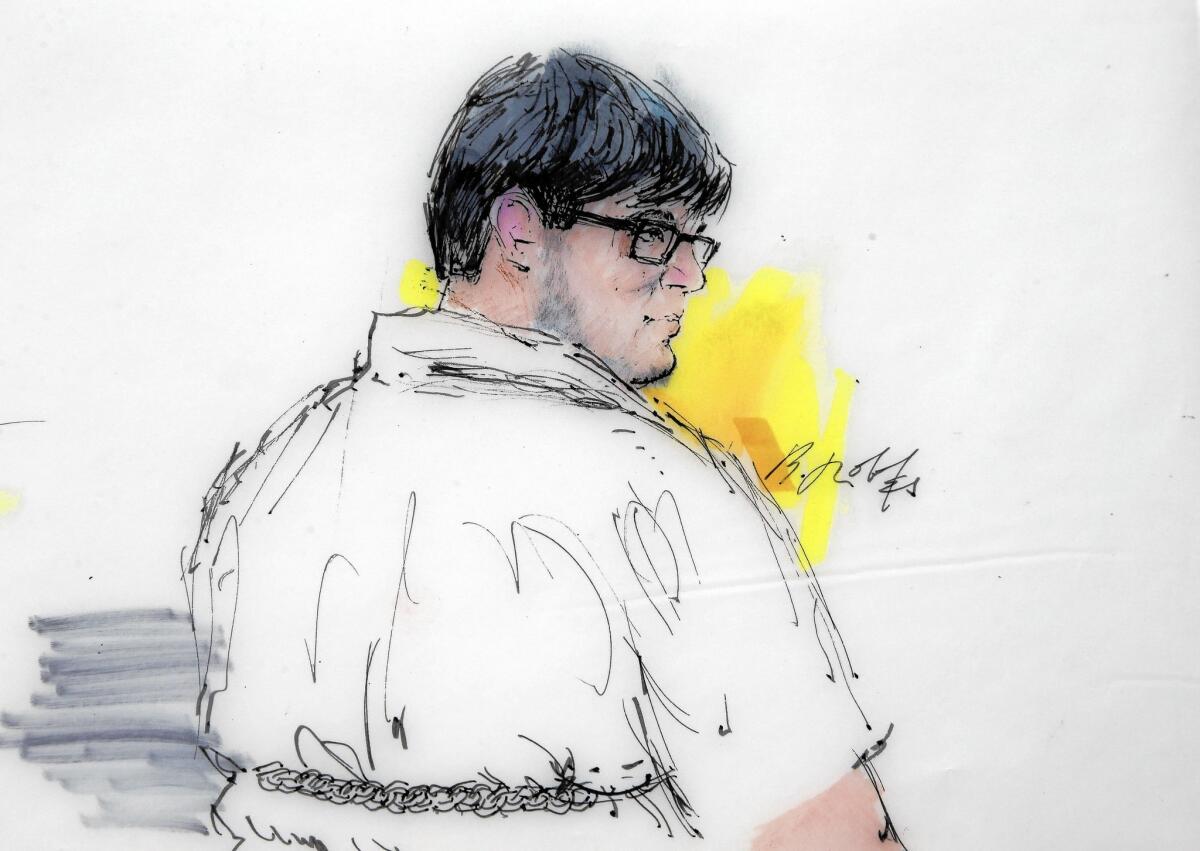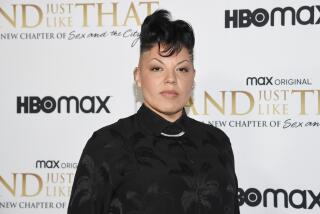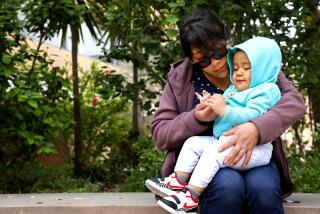Russian sisters’ low profile vanished with the San Bernardino attack

Among the immigrant salespeople at Montebello Town Center, the two sisters from western Russia hardly stood out.
Mariya Chernykh hawked cellphone cases and screen protectors to passersby at a kiosk owned by her sister Tatiana. At night, they retreated to a modest apartment in Rosemead.
But whatever low profile the sisters had suddenly vanished with the San Bernardino terror attack.
Join the conversation on Facebook >>
Tatiana is married to the brother of Syed Rizwan Farook, one of the shooters in the deadliest terrorist attack on U.S soil since 9/11. And Mariya married Enrique Marquez Jr., who was charged with buying the rifles used in the massacre and for allegedly planning an earlier terrorist plot with Farook. Federal prosecutors allege Marquez’s union was a fraud and that he was paid $200 a month to marry Mariya.
Neither sister has been charged with a crime, and officials have made no indication that they knew about Farook and his wife’s plan to open fire at a holiday party in San Bernardino on Dec. 2, killing 14 people.
Documents and interviews trace the sisters’ journey to America, but it remains a mystery how they fell into Farook’s orbit and became so woven into the family.
::
The daughters of Anatolij and Valentina Chernykh came separately to the U.S. from Vysokiy, a village nearly 400 miles south of Moscow. Tatiana secured a short-term educational exchange visa and arrived in 2003, living at some point in Virginia.
Within two years, she married a man in Richmond.
But the couple separated after four years and she filed for dissolution in 2010. By then, she had moved to Southern California and mailed her husband the divorce papers, which were filed in a Pasadena courthouse. He never replied, according to court records.
Tatiana showed an enterprising streak and launched several businesses, including the kiosk at the Montebello mall, according to public records.
Among her employees was her younger sister, Mariya, who left Russia in the summer of 2009, also on a short-term exchange visa.
At the mall, Mariya found a romantic interest in Vram Kupelian, who worked in a nearby shop, he said in an interview. The relationship lasted more than a year, although her busy schedule allowed little time for leisure, he said.
“She pretty much spent seven days working at the mall,” Kupelian said.
Since the sisters’ parents lived in Israel, the prospect of living and working together gave the sisters a support system that life in Russia didn’t offer, he said.
Tatiana, meanwhile, had begun dating Farook’s older brother, Syed Raheel Farook, a U.S. Navy veteran from a first-generation Pakistani family. Friends knew him as Raheel.
The couple jointly registered a license for a cellphone business, according to records filed in Marin County.
On her Russian social media account, Tatiana posted photos of trips the couple took together: to Lake Tahoe, Disneyland and Cancun.
She identified herself online as a businesswoman with a love of comedy films and reality TV shows, such as “The Real Housewives of Orange County.” In the space for “about me,” she wrote, “I [live] in the usa, just got engaged, living a happy life.”
When Tatiana and Raheel married in 2011, the two witnesses on their marriage license were his brother, Syed Rizwan Farook, and Marquez.
The marriage of Tatiana and Raheel was not without its apparent challenges.
While employed part time at a Riverside bank, Tatiana underwent fertility treatment, and she alleged that she lost her job because she went on medical leave, according to a lawsuit she filed in 2014. The case later was settled.
Brittani Adams, 24, who lives down the street from the couple’s townhome in Corona, said they were friendly but sometimes argued.
At least two times since July, police were called to the home on reports of a dispute between Raheel and an unidentified woman, Corona police said.
Riverside County prosecutors declined to file charges, citing insufficient evidence, according to a spokesman.
Tatiana, a state-licensed cosmetologist, once invited Adams over to show off the beauty salon she had in her garage, complete with purple walls and a professional hair dryer.
There, Adams recalled meeting Mariya, whom she described as quiet and more reserved. Tatiana chalked up her younger sister’s reticence to her limited English, Adams recalled.
Mariya crossed paths with Oscar Romero, who works at a flower wholesale business in downtown Los Angeles, according to records. The relationship blossomed, with Mariya using an online name to match her boyfriend’s: Maria Romero, according to an affidavit and an archived copy of the now-deleted profile.
In photos posted online — part of a social media presence that FBI investigators described in the affidavit — she and Romero posed in front of a Christmas tree and in nightclubs. The couple soon had a daughter together.
In a telephone interview with The Times earlier this month, Oscar Romero said he was the father of Mariya’s child but that their relationship had ended and he knew few details of her life.
“Like I said, she’s my baby’s mama. Whatever she does with her life,” he said, is her business.
He didn’t provide a date for their split, except that it happened before she married her husband, Marquez.
When Marquez and Mariya married in a mosque in 2014, the witnesses were her sister and Syed Raheel Farook, according to the marriage license. All four listed their address at Tatiana and Raheel’s Corona home.
But in the days after the shooting, according to a federal affidavit, Marquez said otherwise: He was approached by Raheel to marry Mariya, and in exchange, he would receive $200 a month, according to the affidavit.
The marriage was a ruse, he said, because Mariya had immigration issues and needed a green card, according to court records and federal sources.
While Marquez lived at his parents’ home — they knew nothing of the marriage — his wife continued to live with and date her ex-boyfriend, he told investigators, according to the affidavit.
It’s unclear if Marquez identified Romero as the ex-boyfriend, but he provided the street and city name that matches the location of Romero’s home, according to the affidavit.
When FBI agents descended on Romero’s Ontario home to interview Mariya after the shooting, she said otherwise: that she lived with her husband, sister and brother-in-law.
She and Marquez crammed into a two-bedroom home with at least two other adults and a young child because they could not afford their own place to live, she told the FBI.
Marquez and Mariya’s green card interview was scheduled for Dec. 3, the day after Syed Rizwan Farook and his wife attacked the Inland Regional Center.
In the weeks leading up to the interview, the task of having to appear like a genuine couple seemed to trouble them both, court documents show.
In online messages obtained by investigators, Marquez admitted to Mariya that he was “just a little anxious” and had prepared practice questions, according to the affidavit.
Mariya replied, “Omg!! Enrique I’m the one freaking out here!!! ... I’ll see u Monday and we’ll talk.”
She had urged him to “relax,” adding, “[I]f they decline me its my problem not yours.”
Neither showed up to the interview. Hours after the shooting, Marquez checked himself into a hospital.
Times staff writers Joel Rubin and Sarah Parvini contributed to this report.
MORE ON SAN BERNARDINO
San Bernardino shooting victims: Who they were
Clashing portrayals of Enrique Marquez, friend of San Bernardino shooter
A freeway terror attack is the ‘nightmare we worry about,’ law enforcers say
More to Read
Sign up for Essential California
The most important California stories and recommendations in your inbox every morning.
You may occasionally receive promotional content from the Los Angeles Times.













